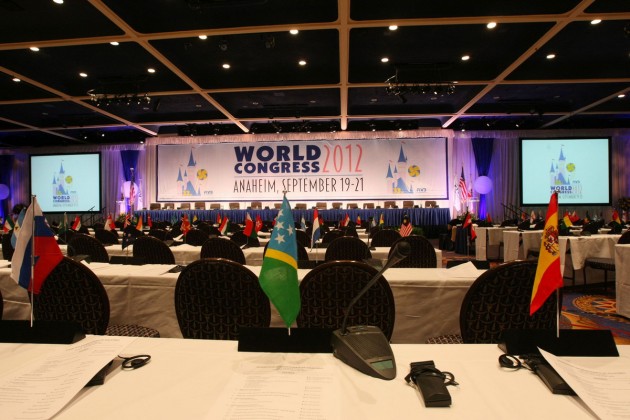
The FIVB President election
With FIVB President Jizhong Wei set to stand down after four years, the 33rd edition of the Congress will usher in a new era for the governing body of international volleyball with the fourth FIVB President set to be elected.
The election of the President is expected to take place at 15:00 (local time) and it will be the first time the FIVB holds an election with three candidates.
The candidates for the FIVB President election term 2012-2016 are the following:
Mr Doug Beal (USA). Mr Beal is an FIVB Board of Administration member and President of USA Volleyball.
Dr Ary Graça (Brazil). Dr Graça is an FIVB Executive Vice-President, President of the South America Volleyball Confederation and the President of the Brazil Volleyball Federation.
Mr Chris Schacht (Australia). Mr Schacht is the President of the Australia Volleyball Federation.
The candidates for the minority gender positions (two to be elected) on the FIVB Board of Administration are the following:
Mrs Marta Centeno O. De Sajche (Guatemala). Mrs Centeno O. De Sajche is an FIVB Executive Vice-President.
Mrs Vilja Savisaar-Toomast (Estonia). Mrs Savisaar-Toomast is the Vice President of the Estonia Volleyball Federation.
Mrs Rita Subowo (Indonesia). Mrs Subowo is an FIVB Executive Vice-President.
The election will be held by secret ballot.
Excerpt from the Rules of Procedure
ELECTION SYSTEM
11.3.1 Election of the President
(a) First round
The candidate that receives more than fifty per cent (50%) of the votes cast is elected at the first round. Abstentions, blank or invalid votes are not taken into consideration for the calculation of the required majority.
(b) Second round
If no candidate is elected at the first round, all candidates except for the two (2) receiving the most votes are eliminated.
A second round between these two (2) candidates shall take place, at which the candidate receiving the highest number of votes is elected.
11.3.2 Election of the two (2) gender-in-minority members of the Board of administration
(a) First round
The two candidates that receive the highest number of votes and more than fifty per cent (50%) of the votes cast are elected in the first round. Abstentions, blank or invalid votes are not taken into consideration for the calculation of the required majority.
(b) Second round
If no candidate is elected at the first round, all candidates except for the three (3) receiving the most votes are eliminated. A second round between these three (3) candidates shall take place, at which the two (2) candidates receiving the highest number of votes are elected.
If only one candidate is elected at the first round, all other candidates except for the two (2) receiving the most votes are eliminated. A second round between these two (2) candidates shall take place, at which the candidate receiving the highest number of votes is elected.
11.3.3 Tie
If the position(s) cannot be filled or a new round initiated as per the above provisions because two or more candidates received the same number of votes, the Congress will take a separate vote between these candidates. The candidate with the highest number of votes will be elected or proceed to the next round of elections, as applicable. This procedure may be applied more than once if the tie persists.
The FIVB Congress approved on Wednesday the appointment of five election scrutineers – Shanrit Wongprasert (THA) for Asia, Habu Ahmed Gumel (NGR) for Africa, Viviane Bosmans (BEL) for Europe, Julio Perez Alfaro (URU) for South America and Saul Castro Verdugo (MEX) for NORECA – to oversee the election process.
The first FIVB Congress took place in Paris, France in 1947 when Mr Paul Libaud was elected as the FIVB’s first President.
FIVB President history:
Mr Paul Libaud (France) 1947-1984
Dr. Ruben Acosta (Mexico) 1984-2008
Mr Jizhong Wei (China) 2008-